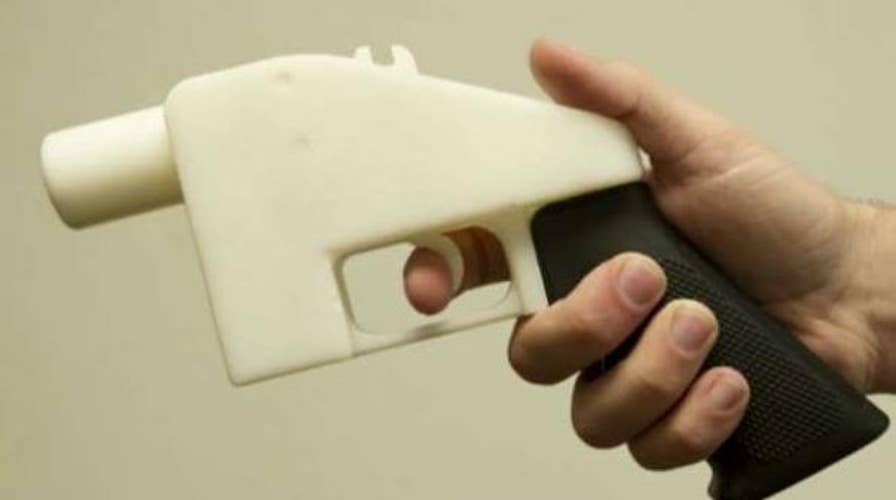Justice Department allows sale of 3D-printed guns
Gun control advocates fear plastic guns may be undetectable after a U.S. government ruling that allows 3D gun printing. Kurt Knutsson, The Cyber Guy, with more.
Blueprints for 3D-printed guns can be downloaded starting next month, following a landmark Department of Justice settlement with Second Amendment advocates.
Defense Distributed, a non-profit defense firm, will offer the blueprints for download starting Aug. 1 following a multiyear legal battle with the federal government.
“It’s personally satisfying,” Defense Distributed director Cody Wilson told Fox News, adding America’s gun culture has been “guaranteed safe passage” into the modern era.
ARMY'S NEW MACHINE GUN WILL BLAST LIKE BATTLE TANKS
Defense Distributed and the Second Amendment Foundation were co-plaintiffs in a 2015 lawsuit against the government, which had forced Wilson’s firm to take blueprints for the “Liberator” 3D-printed gun off its website. More than 100,000 copies of the controversial blueprint were downloaded before the government’s clampdown.
The settlement paves the way for Defense Distributed to again offer the Liberator files, and others for 3D-printed guns, on its website. “Under terms of the settlement, the government has agreed to waive its prior restraint against the plaintiffs, allowing them to freely publish the 3-D files and other information at issue,” explained the Second Amendment Foundation in a statement released July 10.
SAF Founder and Executive Vice President Alan M. Gottlieb heralded the settlement as a victory for free speech, and “a devastating blow to the gun prohibition lobby.”
GLOCK MAKES MILITARY-GRADE PISTOL AVAILABLE TO CIVILIANS
The organizations had filed their suit against the State Department under the Obama administration. In May 2013, the government had cited International Traffic in Arms Regulations (ITAR) when clamping down on Defense Distributed. In its statement SAF described ITAR is a Cold War-era law designed to control export of military items.
The settlement has sparked anger from gun control advocates. “We're extremely concerned about a sudden settlement by the DOJ allowing blueprints for 3-D printed guns to be posted online, and we're looking forward to learning through our FOIA request exactly how this came to be,” tweeted the Brady Campaign to Prevent Gun Violence on July 13.
The Brady Campaign filed its Freedom of Information Act request on Jul. 12.
ARMY SETS SIGHTS ON NEW SNIPER RIFLE
“During the Obama years, the government thought that 3D printed guns posed a serious threat to national security. I'm not aware of anything that has changed except who sits in the White House,” Avery Gardiner, co-president of the Brady Center to Prevent Gun Violence, told Fox News in an emailed statement. “Untraceable and undetectable guns that bypass our bipartisan background check system put us all at risk. The country deserves answers from the Trump Administration about why it thinks this is a good idea. Making it easier for dangerous people to get guns is reckless and stupid, and this is going to make Americans less safe."
Advocates for gun control have argued that 3D-printed guns could also pose security challenges as they pass through airport X-ray machines.
Wilson, who describes current 3D-printed guns as “mostly curiosities,” said that the “big” and “bulky” characteristics of the weapons would help identify them. “I doubt seriously that it’s a real problem,” he added. “If it is a problem, then the [security] norms will have to change.”
US MILITARY EYES FUTURISTIC 'BIONIC ARM' FOR TROOPS
The State Department has also provided some context on the settlement. “This was a voluntary settlement entered into following negotiations between the Department of State and the plaintiffs,” said a State Department spokesperson, in a statement emailed to Fox News. “The court did not rule in favor of the plaintiffs in this case. In other contexts, courts have upheld ITAR controls on technical data.”
“The settlement in this case comes as the U.S. Government is reviewing comments on new proposed regulations to transfer oversight from the U.S. Department of State to the U.S. Department of Commerce of exports of firearms and related items that do not provide the United States with a critical military or intelligence advantage or, in the case of weapons, are not inherently for military end use, including many items that are widely available in retail outlets in the United States and abroad,” the spokesperson added. “These proposed regulations are part of an ongoing effort to create a simpler, more robust export control system that eases industry compliance, enhances enforceability, and better protects truly sensitive technologies.”
The State Department says that, in addition to reducing regulatory burden on U.S. industry, the proposed regulations would eliminate the ITAR requirements at issue in the Defense Distributed case.
“In the course of formulating these proposed regulations, the U.S. Government conducted a national security analysis in the context of the rulemaking effort,” the spokesperson added. “Based on this analysis, it was determined that certain firearms and related items that are widely available for commercial sale, and technical data related to those items, is of a type that does not offer a critical military or intelligence advantage to the United States.”
Fox News’ Perry Chiaramonte contributed to this article.
Follow James Rogers on Twitter @jamesjrogers

